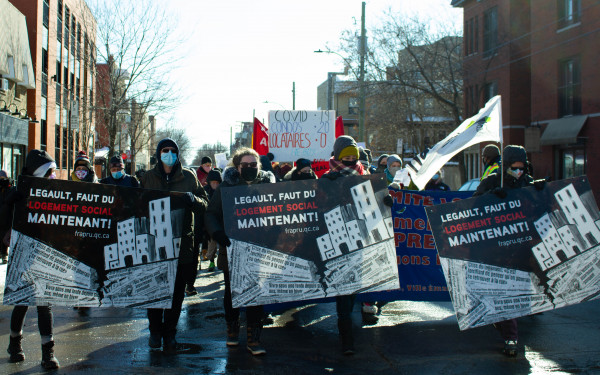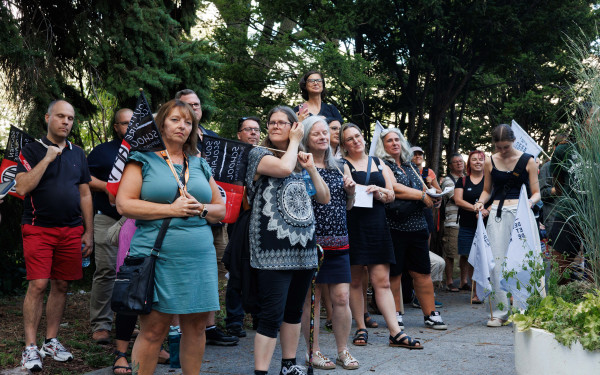Quebec immigration program moratorium closes doors
Closure of key permanent residence programs leaves Montreal workers stranded for options
Pooya Khoshabi was on track to securing his permanent residence (PR).
He had completed all his French courses, passed the necessary French tests and had nearly finalized his PR application documents when he encountered a major setback—the Programme de l’expérience québécoise (PEQ) had closed without warning.
The PEQ is one of the immigration programs managed by Quebec. Like most programs in Quebec, PEQ requires French-language proficiency and is best suited for candidates who have worked in Quebec, like Khoshabi.
Khoshabi moved from Iran to Montreal three years ago to pursue a master’s degree in computer science at Concordia University. He graduated from the program in November 2023 and found a full-time job in the city shortly after.
Before the provincial government announced the PEQ’s sudden closure in October, Khoshabi had been working towards gaining PR status through the program for half a year.
“It happened in one night,” Khoshabi said, snapping his fingers in demonstration. “I gathered my documents and I was in the process of filling out the forms and everything, when suddenly Quebec’s government announced that they’re suspending this program.”
The PEQ wasn’t the only program that got suspended. On Oct. 30, Minister of Immigration, Francization and Integration Jean-François Roberge announced a moratorium on the Regular Skilled Worker Program (RSWP) as well.
The majority of the province’s economic immigrants come from these two programs.
“[The moratorium] closes the door to many people who have developed their lives, both students and workers,” said Manuel Salamanca Cardona, a community organizer with the Immigrant Workers Centre in Montreal. “These people are at risk of losing their status in the near future—that is very likely to happen to some of them.”
The suspension of the PEQ and the RSWP will last until June 2025 and it comes as a result of the province wanting to “limit the number of people admitted as permanent immigrants in 2025,” as stated by Roberge via social media on Oct. 30. The provincial government also stated that this decision will impact the volume of admissions for Quebec immigration programs in 2026. This suspension of Quebec’s two main PR programs was announced on the same day that the province stated it was looking to welcome up to 67,000 immigrants in 2025.
“My point of view is that it’s a sort of intention to push people to leave the country, like a hidden deportation [method],” Salamanca Cardona said.
He added that just recently a woman had come into his office asking questions about the PEQ and the RSWP. According to him, she felt that the most suitable path towards PR status was through one of these two programs, as she could not find any other way to get a work permit in the province.
“She had some hope of applying through the RSWP because she’s from France. But as you see, this option is now closed. She came in [to the office] and she was crying. What can she do now? She was very disappointed,” Salamanca Cardona said. “And I’m talking about a French person, a white person. You can imagine the situation for people who have less privilege.”
For Khoshabi, learning about the decision to suspend the program was especially difficult as he was initially given a Nov. 23 deadline to finish filing all his documents and apply.
“At this point, I was very disappointed, very frustrated,” Khoshabi said.
He added that he was not the only one left with a false sense of security with this deadline.
“There were a lot of people who were secured and they had everything ready, and they just wanted to press a button to apply for the program, but they couldn’t do it,” Khoshabi said. “Why do you announce a deadline if you want to close [the program] at any time that you would like?”
Pegah Abdolkarimi is another recent graduate dealing with PEQ’s closure.
“I had all my documents prepared, but suddenly it was shut down,” said Abdolkarimi, who, like Khoshabi, came to Montreal a few years ago to pursue her studies, and has stayed since. She too was in the process of obtaining PR status.
“We have been trying so hard for this program,” Abdolkarimi said. “It wasn’t fair, what they decided to do all of a sudden.”
“She came in [to the office] and she was crying. What can she do now? She was very disappointed, and I’m talking about a French person, a white person. You can imagine the situation for people who have less privilege.” — Manuel Salamanca Cardona
Khoshabi mentioned that many people will no longer be eligible for the PEQ when it reopens at the end of June next year. The program, targeted towards recent graduates of Quebec post-secondary academic institutions, states that applicants have to have received their diploma within the 36 months preceding their application. Anyone approaching the 36-month mark for their application this year risks not meeting the eligibility criteria for the PEQ by the time it returns.
Both Khoshabi and Abdolkarimi have been learning French for around half a year, practicing for the mandatory French evaluation that is a requirement to apply for the PEQ and RWSP programs. The evaluation requires immigrants to pass in four different sections: speaking, listening, writing and reading. Khoshabi and Abdolkarimi both passed the evaluation.
The two expressed that it was an added layer of frustration that so much personal time and effort went into learning an additional language, only for the programs to be shut down just days later.
Khoshabi explained that one of the biggest motivating factors for him was knowing that, at the end of the day, these French classes would lead to his PR status. He would spend most of his spare time outside of work practicing for the evaluation.
“Every day that I could have a vacation for, I was studying French,” Khoshabi said.
The government-offered French lessons, while being what she described as a good and helpful resource, were a daily commitment that she could not fulfil given her full-time job. Due to the nature of her job, Abdolkarimi had to resort to spending money for private French lessons.
Now, both she and Khoshabi are uncertain whether the evaluation they passed will still be relevant by the time the programs’ suspensions are lifted in June 2025.
Despite her love for the city, Abdolkarimi expressed that she will likely search for a new job outside of Montreal now due to the moratorium, adding that she’d rather not have to pay out of pocket for more French lessons if it comes to it.
“We are human, we have to decide what to do for our future, we have a schedule,” she said.
According to Khoshabi, immigrating to Montreal was already difficult and he would rather not have to start the process over elsewhere.
“I didn’t have a family [in Montreal] at first, but I started building up friendships and networking so I preferred to stay here for work, and I found a place to work so everything is good here,” Khoshabi said. “I really like my life here, so [staying] is my priority.”
This article originally appeared in Volume 45, Issue 6, published November 19, 2024.

_1_900_1350_90.jpeg)





